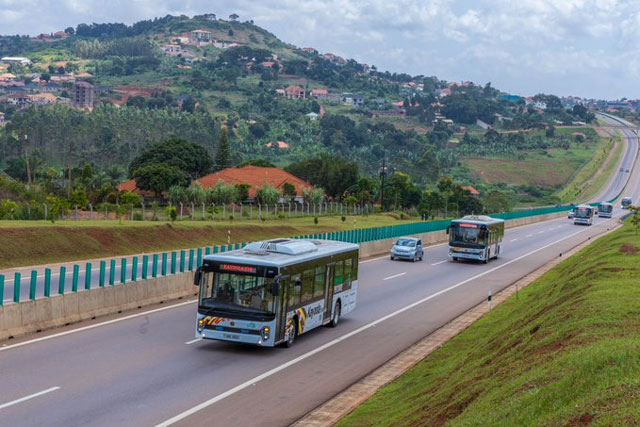
Kampala, Uganda | THE INDEPENDENT | The United Nations Development Programme – UNDP has described as ‘promising’ Uganda’s speedy transition towards electric mobility as a lasting solution to the supply shocks of fossil fuel and its hazards.
E-mobility is a concept of using electric powertrain technologies, in-vehicle information, and communication technologies and connected infrastructures to enable the electric propulsion of vehicles in fleets.
In September 2022, Uganda submitted its updated Nationally Determined Contributions (NDC), a climate action plan to cut emissions and adapt to climate impacts. The NDC projects that the transport sector greenhouse emissions – GHG emissions will more than double by 2030 with the energy and transport sector contributing 10.7% of the total emissions.
The mitigation measures in the NDC include the shift to electric cars, road infrastructure development, electrification of the railway system, and transfer of oil through the oil pipeline instead of road freight among others.
Elsie Attafuah, the UNDP’s Resident Representative to Uganda notes that these measures also have the potential to contribute towards the achievement of the 24.7% emission reduction target for the country, which will contribute to better energy security and lower cost of doing business, cheaper transport with electric motorcycles, cars, buses, or trains than it is using internal combustion engines.
She explained that UNDP has over the past few years developed and implemented projects to support the scaling up of electric mobility projects in several countries and that currently, UNDP has over 50 electric mobility projects under implementation or at preparation stages globally.
She said UNDP has also established a global facility to help reduce UNDP’s carbon footprint by 5% by 2025 and 50% by 2030. Through this facility, she notes that UNDP is taking measures to continue reducing one of its top three greenhouse gas emission sources – UNDP’s vehicle fleets.
In preparation for a transition to greener vehicle fleets, Attafuah revealed that UNDP is supporting its country offices to shift their vehicle from internal combustion engines to electric vehicles, adding that the UNDP has supported the Government of Uganda to revise the NDC where specific targets on sustainable transport have been set to include introducing scaling up adoption of electric vehicles and implementing a 1,412kms fully electrified standard gauge rail by 2050.
In the broader energy sector, UNDP has supported the government in the energy transition by promoting energy access in social institutions through photovoltaic – PV installations in 24 health centres, implemented a pilot to promote the shift from use of biomass to electricity for cooking in Mulago National Referral Hospital, and promotion of water to energy initiatives among others.
The Representative implored Uganda to further improve urban planning, prioritize public transport over private cars, plan and design to accommodate a rich mix of electric mobility options, and strengthen public-private partnerships to achieve e-mobility.
The Minister of State for Energy and Mineral Development Okaasai Opolot, says a shift to electric vehicles that has been championed by Kiira Motors has proven beyond doubt that it is cheaper to use electric vehicles than fuel-based vehicles.
We are Spearheading the Promotion of Environmentally Friendly Transport Solutions.
Read about the Ugandan-Made all-electric #KayoolaEVS here; https://t.co/jp6vAgJVf3 pic.twitter.com/yiouRXpEyl
— 𝐊𝐢𝐢𝐫𝐚 𝐌𝐨𝐭𝐨𝐫𝐬 (@KiiraMotors) October 31, 2022
Together with my colleagues the Board of Directors of @KiiraMotors, we visited the #KiiraVehiclePlant in Jinja to check on progress. Amazing work being done by @NECUPDF and our team at KMC.@PIMusasizi @DrMusenero @Thomas_Tayebwa @nyamadon pic.twitter.com/6kpW8Ef9TL
— Ronald Rwankangi (@rrwankangi) November 3, 2022
Minister Okaasai says that in order to provide for electric charging of electric vehicles, the Ministry in partnership with the private sector has embarked on developing a regulatory framework for setting up charging infrastructure and providing affordable access to electricity.
Dr. Monica Musenero, the Minister of Science, Innovations and Technology – SIT says to speed up the e-mobility industry, the Government is focusing on managing public fears during the energy transition period which is mythically associated with the high cost of production and purchase of electric vehicles.
The pioneers of e-mobility in Uganda so far are Zembo, Bodawerk and Kiira Motors Corporation. The much sought-after electro-mobility aligns with the third target of the 7th Sustainable Development Goal – SDG to “double the global rate of improvement in energy efficiency by 2030.”
Dozens of energy sector actors across the globe have convened at Speke Resort Munyonyo in Kampala for Energy Efficiency and Electric Mobility Conference 2022 to discuss and reflect on mechanisms to promote efficient and rational utilization of energy, financing mechanisms and business models for e-mobility.
The weeklong conference which started on Monday this week and ended on Saturday has been organized by the Ministry of Energy and Mineral Development backed by UNDP, Energy Efficiency Association of Uganda, Uganda Manufacturers Association and GIZ, a German development agency.
The 2022 World Energy Outlook released by the International Energy Agency in October 2022 indicates there were 16.5 million electric cars on the world’s roads by 2021 up from 120,000 electrical cars sold worldwide in 2012. The Outlook projects that global electric vehicle sales will surpass 10 million in 2022 and that electric vehicles will account for over 25-35% of total new car sales by 2030.
******
URN
 The Independent Uganda: You get the Truth we Pay the Price
The Independent Uganda: You get the Truth we Pay the Price



It is a great innovation.